英语四级作文真题:工作or考研.docx
毕业后去参加工作还是去读研究生的英语作文
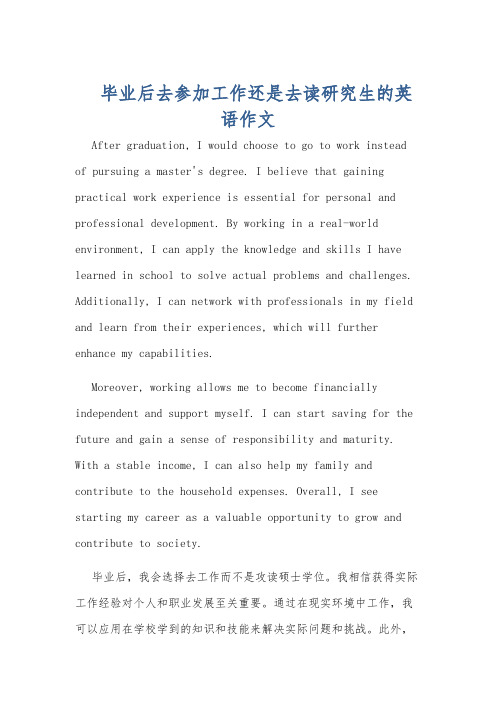
毕业后去参加工作还是去读研究生的英语作文After graduation, I would choose to go to work instead of pursuing a master's degree. I believe that gaining practical work experience is essential for personal and professional development. By working in a real-world environment, I can apply the knowledge and skills I have learned in school to solve actual problems and challenges. Additionally, I can network with professionals in my field and learn from their experiences, which will further enhance my capabilities.Moreover, working allows me to become financially independent and support myself. I can start saving for the future and gain a sense of responsibility and maturity. With a stable income, I can also help my family and contribute to the household expenses. Overall, I see starting my career as a valuable opportunity to grow and contribute to society.毕业后,我会选择去工作而不是攻读硕士学位。
大学毕业选择考研还是工作英语作文
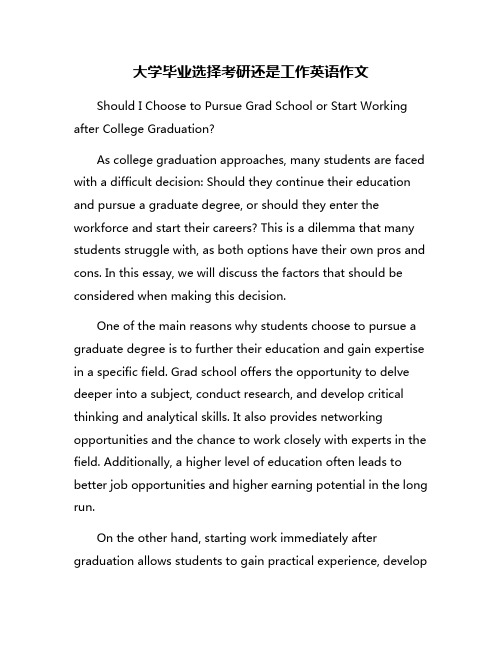
大学毕业选择考研还是工作英语作文Should I Choose to Pursue Grad School or Start Working after College Graduation?As college graduation approaches, many students are faced with a difficult decision: Should they continue their education and pursue a graduate degree, or should they enter the workforce and start their careers? This is a dilemma that many students struggle with, as both options have their own pros and cons. In this essay, we will discuss the factors that should be considered when making this decision.One of the main reasons why students choose to pursue a graduate degree is to further their education and gain expertise in a specific field. Grad school offers the opportunity to delve deeper into a subject, conduct research, and develop critical thinking and analytical skills. It also provides networking opportunities and the chance to work closely with experts in the field. Additionally, a higher level of education often leads to better job opportunities and higher earning potential in the long run.On the other hand, starting work immediately after graduation allows students to gain practical experience, developprofessional skills, and earn a steady income. It also provides the opportunity to learn on the job, build a professional network, and gain valuable insights into different industries. Working after graduation can also help students determine if they are truly passionate about their chosen field and if further education is necessary for their career goals.When making the decision between pursuing grad school or starting work after graduation, students should consider their long-term career goals, financial situation, personal interests, and the job market in their chosen field. It is important to weigh the benefits and drawbacks of each option and determine which one aligns best with their individual goals and aspirations.In conclusion, the decision to pursue a graduate degree or start working after college graduation is a personal one that should be made based on careful consideration of various factors. Whether you choose to continue your education or enter the workforce, remember that there is no right or wrong answer. Ultimately, what matters most is that you are taking steps towards achieving your career goals and following your passions.。
[英语四级作文]2016年12月英语四级作文题目:就业还是考研/读书?
![[英语四级作文]2016年12月英语四级作文题目:就业还是考研/读书?](https://img.taocdn.com/s3/m/2a9543d7e518964bce847c14.png)
2016年12月英语四级作文题目:就业还是考研/读书? For this part, you are allowed 30 minutes to write an essay. Suppose you have two options upon graduation: one is to take a job in a company and the other to go to a graduate school. You are to make a choice between the two. Write an essay to explain the reasons for your choice. You should write at least 120 words but no more than 180 words. 【精彩范文1】: For undergraduates college students, deciding what to do upon graduation can be a tough decision to say the least. From my point of view, I prefer to pursuing postgraduate students. My choice can be attributed to the following two driving forces. For one thing, I want to continue my studies for their own sake because I love what I am doing. In fact, having a passion for my subject is possibly the best reason to go into postgraduate education. For another thing, entering into a postgraduate school, I can improve my job prospects. Specializing at postgraduate level can make you a stronger job applicant. Actually, when in comes time for university graduates to decide their next step in life, there is no on right or wrong choice for everyone. Rather, each students must reach his or her own conclusion. 【参考译文】 对于本科生来说,决定毕业工作之后做什么毫不夸张的说是一个艰难的决定。
大学毕业选择考研还是工作英语作文

大学毕业选择考研还是工作英语作文全文共3篇示例,供读者参考篇1Many college graduates face the tough decision of whether to continue their education by pursuing a postgraduate degree (often through taking the graduate entrance exam) or to enter the workforce. This decision is not to be taken lightly, as it can greatly impact one's future career path and personal growth. In this essay, we will explore the pros and cons of each option to help guide graduates in making an informed decision.Firstly, let's consider the option of pursuing a postgraduate degree through taking the graduate entrance exam. One of the main advantages of this path is the opportunity to deepen one's knowledge in a specific field of interest. By continuing their education, graduates can gain expertise in their chosen subject area and increase their market value in the job market. Furthermore, a postgraduate degree can open up new career opportunities and enhance earning potential in the long run. Additionally, graduate school provides a more structured learning environment and the chance to conduct research and engage in academic pursuits.However, there are also drawbacks to pursuing a postgraduate degree. Most notably, graduate school can be a significant financial investment, with tuition fees, living expenses, and potential loss of income while studying. It can also be a time-consuming commitment, often taking several years to complete a master's or doctoral program. Furthermore, there is no guarantee that a postgraduate degree will lead to a higher salary or better job prospects, as the job market is highly competitive and experience is often valued over academic qualifications.On the other hand, entering the workforce after graduation also has its merits. One of the main advantages of starting work immediately is gaining practical experience and developing important professional skills. By working in a real-world setting, graduates can learn valuable job skills, build a professional network, and gain insight into their chosen industry. Additionally, entering the workforce allows graduates to start earning money and become financially independent sooner.However, there are also disadvantages to entering the workforce right after graduation. Without a postgraduate degree, graduates may find themselves limited in terms of career advancement and earning potential. Some companies mayrequire a postgraduate degree for certain positions or promotions, putting those without one at a disadvantage. Additionally, without further education, graduates may miss out on the opportunity to pursue their academic interests further and engage in research and scholarly activities.In conclusion, the decision of whether to pursue a postgraduate degree through the graduate entrance exam or to enter the workforce after college is a personal one that should be based on individual goals, interests, and circumstances. Both options have their own set of pros and cons, and it is important for graduates to weigh these factors carefully before making a decision. Ultimately, choosing the right path will greatly influence one's future career success and personal fulfillment.篇2Choosing between pursuing a postgraduate degree or entering the workforce upon graduation is a common dilemma for many college students. This decision can have a significant impact on one's future career path and opportunities. In this essay, I will explore the factors to consider when making this decision and discuss the advantages and disadvantages of both options.Firstly, let's consider the option of pursuing a postgraduate degree, such as a Master's or Ph.D. There are several reasons why some students choose to further their education. One of the main motivations is to enhance their academic qualifications and gain specialized knowledge in a specific field. This can improve their job prospects and open up opportunities for higher-paying and more prestigious positions in the future. Additionally, pursuing a postgraduate degree can provide valuable research experience and help students develop critical thinking and problem-solving skills.However, there are also drawbacks to consider when deciding to pursue further education. One of the main concerns is the cost of tuition and living expenses, as postgraduate programs can be quite expensive. Additionally, investing more time in studying means delaying entry into the job market and potentially missing out on gaining valuable work experience. Furthermore, the job market for postgraduates can be competitive, and there is no guarantee of finding a job immediately after graduation.On the other hand, entering the workforce after college has its own set of advantages and disadvantages. Starting a career right away allows individuals to gain practical experience,develop professional skills, and build a network of contacts in their chosen industry. This can lead to faster career progression and opportunities for advancement. Furthermore, earning a steady income can help individuals become financially independent and start saving for the future.However, entering the workforce directly after college may limit opportunities for career advancement in the long term. Many employers nowadays prefer candidates with advanced degrees and specialized skills. Without a postgraduate degree, individuals may find it challenging to compete for higher-level positions and may eventually hit a plateau in their careers. Additionally, some industries require postgraduate qualifications for certain roles, so not having a Master's or Ph.D. could be a barrier to entry in those fields.In conclusion, the decision to pursue further education or enter the workforce after college is a personal choice that depends on individual goals, interests, and circumstances. It is important to carefully weigh the pros and cons of both options and consider factors such as financial constraints, career aspirations, and personal development. Ultimately, whether one chooses to pursue a postgraduate degree or start working rightafter graduation, it is essential to make an informed decision that aligns with their long-term career goals and aspirations.篇3Should University Graduates Choose to Pursue Further Studies or Enter the Workforce?IntroductionAfter completing their undergraduate degrees, many university graduates are faced with the dilemma of whether to continue their studies by pursuing a postgraduate degree or to enter the workforce and start their professional careers. This decision is not an easy one to make, as both options have their own advantages and disadvantages. In this essay, we will explore the pros and cons of choosing to go to graduate school or to work after obtaining a bachelor's degree.Reasons to Choose Graduate School1. Specialization: One of the main reasons why many graduates choose to pursue further studies is to specialize in a specific field or area of study. A postgraduate degree allows students to delve deeper into their chosen discipline and acquire advanced knowledge and skills that can make them experts in their field.2. Career Advancement: In today's highly competitive job market, having a postgraduate degree can give graduates a competitive edge and enhance their career prospects. Many employers value candidates with advanced degrees and are more likely to offer higher paying and more prestigious job positions to those with a postgraduate qualification.3. Personal Development: Going to graduate school is not just about acquiring knowledge and skills, but also about personal growth and development. Postgraduate programs often provide opportunities for students to engage in research, work closely with faculty members, and participate in academic discussions and conferences, which can help them develop critical thinking, analytical, and communication skills.Reasons to Choose Work1. Practical Experience: While graduate school can be a great way to acquire theoretical knowledge, working in the real world provides invaluable practical experience that can help graduates develop essential skills and competencies that are highly valued by employers. By working in a professional setting, graduates can gain hands-on experience, build a professional network, and learn valuable soft skills such as teamwork, time management, and problem-solving.2. Financial Considerations: Pursuing a postgraduate degree can be a significant financial investment, as tuition fees for graduate programs are often expensive. On the other hand, entering the workforce allows graduates to start earning a salary and become financially independent. Working full-time can also provide opportunities for career advancement and salary increases over time, which can help graduates achieve financial stability and security.3. Career Exploration: For graduates who are uncertain about their career goals or interests, working can be a valuable way to explore different industries, roles, and job opportunities. By gaining exposure to different working environments and job responsibilities, graduates can discover their strengths, interests, and career preferences, which can help them make more informed decisions about their future career paths.ConclusionIn conclusion, the decision to pursue further studies or to enter the workforce after graduating from university depends on the individual's career goals, personal interests, financial situation, and professional aspirations. Both options have their own benefits and drawbacks, and it is important for graduates to carefully consider their options and weigh the pros and cons ofeach before making a decision. Ultimately, whether to go to graduate school or to work is a personal choice that should be based on the individual's unique circumstances and goals.。
毕业后工作还是研究生 英语作文

毕业后工作还是研究生英语作文Title: To Work or Pursue a Postgraduate Degree After GraduationEver since the completion of my undergraduate studies, a question that has been lingering in my mind is whether to dive into the workforce or pursue a postgraduate degree. Both options have their merits and drawbacks, and making a decision requires careful consideration of various factors.To start with, entering the workforce after graduation has its appeal. By embarking on a career, I would be able to gain practical experience, earn a salary, and start building a professional network. This would enable me to become financially independent and learn valuable skills that cannot be taught in a classroom. Moreover, the real-world experience would enhance my understanding of my chosen field and provide me with a clearer idea of my long-term career goals.On the other hand, pursuing a postgraduate degree has its own advantages. It would allow me to deepen my knowledge in a specific area, conduct research, and contribute to the academic community. A higher level of education would also increase my chances of securing better job opportunities in the future, as well as potentially higher earning potential. Additionally, a postgraduate degree would postpone the need to enter the workforce, providing me with more time to explore my interests and decide on a career path.However, there are also considerations to take into account when choosing either option. For instance, entering the workforce immediately might mean facing the pressures of job responsibilities and competition. Additionally, without further education, there could be a limit to my career growth in the long run. On the other hand, pursuing a postgraduate degree requires a significant investment of time and money, and there is no guarantee that it will lead to better job prospects or higher salaries.In conclusion, the decision between entering the workforce or pursuing a postgraduate degree is a complex one. It ultimately depends on my personal goals, aspirations, and circumstances. I believe that a thorough evaluation of my interests, career objectives, and financial situation would provide me with the clarity needed to make the right decision. Whichever path I choose, it is crucial to approach it with determination, dedication, and an open mind, ensuring that I maximize the opportunities available to me and make the most of my post-graduation journey.。
就业还是考研英语作文

就业还是考研英语作文Should I Pursue Employment or Postgraduate Studies?In today's society, many college graduates face a tough decision: should they enter the job market or continuetheir studies by pursuing a postgraduate degree? This dilemma has sparked a heated debate among students, parents, and educators. While some argue that finding a job after graduation is the best option, others believe thatfurthering one's education through postgraduate studies is more advantageous. In my opinion, the decision ultimately depends on an individual's goals, aspirations, and personal circumstances.Those who advocate for entering the job market arguethat it provides immediate financial stability andpractical experience. With a degree in hand, graduates can start earning a salary and become financially independent. Moreover, they argue that real-world experience isinvaluable and can provide a competitive edge in the longrun. By entering the workforce, individuals can gain practical skills, build a professional network, and learn about the realities of their chosen field.On the other hand, proponents of pursuing postgraduate studies argue that it offers numerous benefits in terms of career advancement and specialization. By obtaining amaster's or a doctoral degree, individuals can enhancetheir knowledge and skills, making them more competitive in the job market. Moreover, postgraduate studies oftenprovide opportunities for research and academic exploration, allowing individuals to contribute to their field of study. Additionally, some professions, such as medicine or law, require advanced degrees for individuals to practice, making postgraduate studies a necessary step.When making this decision, it is crucial to considerone's long-term goals and aspirations. If an individual has a clear career path in mind that requires advanced education, pursuing postgraduate studies might be the best option. For example, if someone dreams of becoming a university professor or a research scientist, obtaining adoctoral degree is essential. On the other hand, if an individual's goals are more practical and require immediate financial stability, entering the job market might be the better choice.Another important factor to consider is personal circumstances. Some individuals may have financial constraints that make pursuing postgraduate studies difficult. In these cases, finding a job and earning a salary can provide the necessary financial support. Additionally, personal obligations, such as supporting a family or taking care of elderly parents, may make it difficult to commit to further studies. In such situations, finding a job that provides stability and flexibility might be the more practical choice.In conclusion, the decision to pursue employment or postgraduate studies after graduation is a deeply personal one. It depends on an individual's goals, aspirations, and personal circumstances. While finding a job after graduation offers immediate financial stability and practical experience, pursuing postgraduate studies canlead to career advancement and specialization. Ultimately, individuals should carefully consider their long-term goals and personal circumstances before making this decision.。
大学毕业选择考研还是工作英语作文
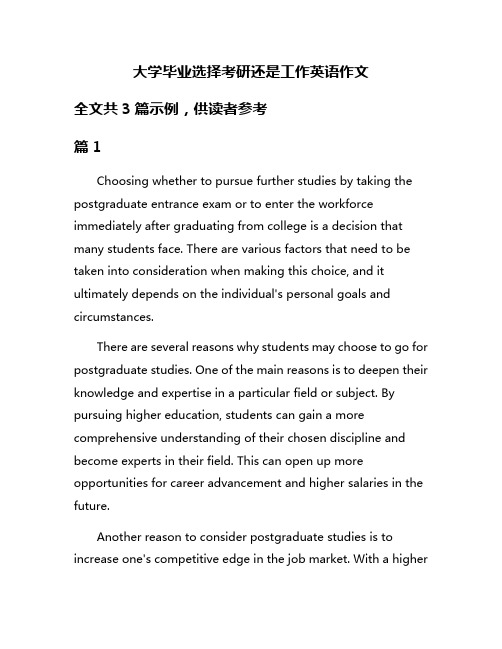
大学毕业选择考研还是工作英语作文全文共3篇示例,供读者参考篇1Choosing whether to pursue further studies by taking the postgraduate entrance exam or to enter the workforce immediately after graduating from college is a decision that many students face. There are various factors that need to be taken into consideration when making this choice, and it ultimately depends on the individual's personal goals and circumstances.There are several reasons why students may choose to go for postgraduate studies. One of the main reasons is to deepen their knowledge and expertise in a particular field or subject. By pursuing higher education, students can gain a more comprehensive understanding of their chosen discipline and become experts in their field. This can open up more opportunities for career advancement and higher salaries in the future.Another reason to consider postgraduate studies is to increase one's competitive edge in the job market. With a higherlevel of education, candidates may be more attractive to potential employers and have an advantage over other job applicants. Additionally, some professions may require a postgraduate degree for entry or advancement, so pursuing further studies may be necessary to achieve career goals in certain industries.On the other hand, some students may choose to enter the workforce immediately after completing their undergraduate degree. One of the main reasons for this decision is the need to start earning money and gaining practical work experience. By entering the workforce early, students can begin building their career, establishing a professional network, and gaining valuable skills that can help them advance in their chosen field.Furthermore, some students may prefer to take a break from studying and enjoy a period of relaxation after completing their undergraduate degree. This can be a time to travel, pursue hobbies, or spend time with family and friends before making a commitment to further studies. Taking time off can also provide students with an opportunity to reflect on their career goals and determine whether postgraduate studies are the right path for them.Ultimately, the decision to pursue postgraduate studies or enter the workforce after graduating from college is a personal one that should be based on individual goals, interests, and circumstances. It is important for students to carefully weigh the pros and cons of each option and consider how each choice may impact their future career prospects. Whether one chooses to pursue further studies or start working immediately, it is essential to make a decision that aligns with one's long-term goals and aspirations.篇2Is It Better to Pursue a Master's Degree after Graduation or Start Working?After graduating from college, many students find themselves facing a major decision: should they further their education by pursuing a master's degree or should they enter the workforce and start their career? This is a common dilemma that many graduates encounter, and there are valid arguments for both options. In this essay, I will explore the pros and cons of both paths and offer some guidance on how to make a decision that aligns with your goals and aspirations.First and foremost, let's consider the option of pursuing a master's degree after graduation. There are several reasons why this might be a good choice for some students. One of the major benefits of continuing your education is the opportunity to specialize in a specific field or gain advanced knowledge in your area of interest. A master's degree can make you more qualified for certain job positions and can increase your earning potential in the long run. Additionally, pursuing further education can provide you with the opportunity to build a strong professional network and connect with peers and mentors who can support your career development.On the other hand, starting to work after graduation also has its advantages. For some students, gaining practical work experience is more valuable than pursuing further education. Working in the industry can help you apply the knowledge and skills you gained during your undergraduate studies and can give you a better understanding of your field. Furthermore, starting your career early can help you build a strong professional reputation and establish yourself in your chosen industry. Many employers value real-world experience and may prefer candidates who have proven themselves in a professional setting.Ultimately, the decision to pursue a master's degree or start working after graduation should be based on your personal goals and aspirations. Here are some factors to consider when making this decision:1. Consider your long-term career goals: Think about where you see yourself in five or ten years and consider whether further education or work experience will help you achieve those goals.2. Evaluate your financial situation: Pursuing a master's degree can be expensive, so it's important to consider whether you can afford to further your education without going into significant debt.3. Consult with mentors and professionals in your field: Seeking advice from experienced professionals can help you gain valuable insights into the career paths available to you and can help you make an informed decision.4. Reflect on your personal interests and strengths: Consider whether you have a strong passion for a specific field of study or if you thrive in a professional setting. This can help you determine whether further education or work experience is the right choice for you.In conclusion, there is no right or wrong answer when it comes to deciding whether to pursue a master's degree or start working after graduation. Both paths have their benefits and it's important to carefully consider your goals, financial situation, and personal interests before making a decision. Remember that education is a lifelong journey and there are many opportunities for growth and development throughout your career. Ultimately, the most important thing is to choose a path that aligns with your values and aspirations and will help you achieve success and fulfillment in your professional life.篇3Should College Graduates Choose to Pursue a Master's Degree or Enter the Workforce?In the modern world, the decision between pursuing a master's degree or entering the workforce after college has become increasingly important for college graduates. This decision can have a significant impact on a person's career trajectory, earning potential, and overall quality of life. In this essay, I will discuss the factors that college graduates should consider when making this decision and explore the benefits and drawbacks of each choice.One of the main factors that college graduates should consider when deciding between pursuing a master's degree or entering the workforce is their career goals and aspirations. If a person has a clear idea of the career path they want to pursue and knows that a master's degree is necessary or beneficial for achieving their goals, then pursuing further education may be the right choice. On the other hand, if a person is unsure about their career goals or feels that they can gain valuable experience and skills by entering the workforce, then starting a job after college may be the better option.Another important factor to consider is the earning potential associated with each choice. In general, people with master's degrees tend to earn higher salaries than those with only a bachelor's degree. However, it is important to weigh the costs of obtaining a master's degree, such as tuition and lost income during the time spent in school, against the potential increase in earnings. Additionally, gaining work experience can also lead to higher salaries in the long run, so it is important to consider the potential for career growth and advancement in the workforce.Furthermore, college graduates should consider the job market and demand for their skills when making this decision. In some fields, having a master's degree is essential for advancingin a career or obtaining certain jobs. In other fields, employers place more value on practical experience and skills gained in the workforce. It is important for college graduates to research the job market in their desired field and understand the qualifications and requirements for the positions they are interested in.There are advantages and disadvantages to both pursuing a master's degree and entering the workforce. Pursuing a master's degree can lead to greater specialization and expertise in a particular field, making a person more competitive in the job market. It can also open up opportunities for career advancement and higher salaries. On the other hand, entering the workforce immediately after college can provide valuable real-world experience, skills, and networking opportunities that can benefit a person's career in the long term.In conclusion, the decision between pursuing a master's degree or entering the workforce after college is a complex and personal one that should be based on a person's individual goals, aspirations, and circumstances. College graduates should carefully consider their career goals, earning potential, the job market, and the advantages and disadvantages of each choicebefore making a decision. Ultimately, the best choice will depend on a person's unique circumstances and priorities.。
四级作文工作还是考研范文

六级作文:考研好还是工作好?As far as I am concerned,getting a higher degree has long been my dream.This is based on my belief that I should do more research and learn more while I am still young.大学毕业后是就业还是考研英语作文?大学毕业后是就业还是考研英语如果家里有条件的话,建议还是继续深造。
因为现在特定的环境下,金融危机下很多大中型的中国本土企业或是合资企业开始裁员或是强制减少工作日从而降低所需付的工资,再加之目前所需的岗位和现实毕业生相脱离的现象也凸显的更加严重。
现在像我们很多已经参加工作有几年的人,才体会到自己停留在某一个工作环境中想要让自己的工作环境和水准提升都要靠这块敲门砖。
所以当你真正走出校园迈向一个全新的工作环境你不一定能去很好的适应的了。
低层的工作环境是必经的,更何况现在这个平台实在是太小了,可以说是这个非常时期起着很大的作用。
也有人说考研是为了逃避竞争激烈的就业压力,所以才选择了这条路,当几年的研究生毕业后又要面临的择业的选择是有可能又是一次在就业与失业的门槛处徘徊。
之所以这么说是想楼主你能够明白考研的意义所在,考研也是一条路,虽然考出来还会有遍地研究生的感觉,但是你的起点已经高了,不存在和绝大多数人去竞争一个也许你并不太满意的岗位的情况,因为那仅仅是一份普普通通的小职员的工作而已!同时也要摆正心态,一旦决定要考研的话,就一定要在考之前给自己的今后做个定位,这样才能在你人生的又一个十字路口上做出抉择!以免读出来后又是一片迷茫,迷茫的是自己该找怎样的工作,论学历也不算低了,论工资低了也接受不了,还是一个心态问题。
对于你的学历和能力来说你一定要有自信,只是你要看看你的专业和什么要的工作岗位对口,以及各相关职业对自身的发展哪个潜力更大。
考研还是工作 四级作文

考研还是工作四级作文《考研还是工作》篇一《考研的纠结与美好憧憬》考研和工作,这可真像站在岔路口,不知道该往哪边走。
我一朋友小明,就是在这事儿上纠结得头发都掉了不少。
他呀,是个特有想法的人。
他大学读的是计算机专业,成绩马马虎虎,平时就喜欢捣鼓一些小程序。
一到毕业季,大家都忙起来了。
有的同学很快就定好了工作,去那些有名的互联网公司开始上班了。
小明呢,就开始琢磨自己到底是考研还是工作。
他要是考研呢,就想着能去那所特别牛的大学,听说那里的计算机实验室超级酷,各种新设备,还能跟着大牌教授做项目。
他想象着自己坐在那个大学校园里,周围都是学霸,自己天天在知识的海洋里遨游,研究那些高深的算法。
他脑海里已经出现自己以后成为一个超级厉害的计算机专家,给某个大公司做技术顾问的画面了。
可是他又有点怕考研,那些数学公式,英语单词,专业知识堆起来就像一座小山。
备考期间肯定是没日没夜的,就像个苦行僧似的。
他跟我说起这些的时候,眼睛里一会儿放光一会儿暗淡。
我都能想象到他趴在那一堆考研书籍前面,头发乱得像鸟窝,黑眼圈重得像熊猫的样子。
他还跟我讲他有次去那个他心仪的大学参观,走在校园里就像走进了知识殿堂。
他路过那些教学楼,看到里面的教室里坐满了认真听讲的学生,实验室里那些科研设备闪闪发光,他就更心动了。
可是一想到考研的难度,就有点打退堂鼓。
总之,对于小明来说,考研就像是一个神秘又充满诱惑的魔法门,门后面可能是宝藏,但是要找到打开门的钥匙得费好大的劲儿。
篇二《工作的现实与诱人之处》再说说工作这边的事儿吧。
工作这个东西呢,就像是手里实实在在抓着的面包,能填肚子。
小明那个室友小李,就直接选择了工作。
小李找了一份在小互联网公司做程序员的工作。
工资虽然不是特别高,但也还过得去。
小李刚去上班的时候可兴奋了。
第一天去,穿着崭新的衬衫,还打了个领带。
他跟小明说,一进那个公司,感觉特别有活力,大家都忙忙碌碌的。
小李的工作可不像在学校那么悠闲了。
他每天早上要挤那挤死人不偿命的地铁,被人群像粽子一样裹着。
考研还是工作 四级作文
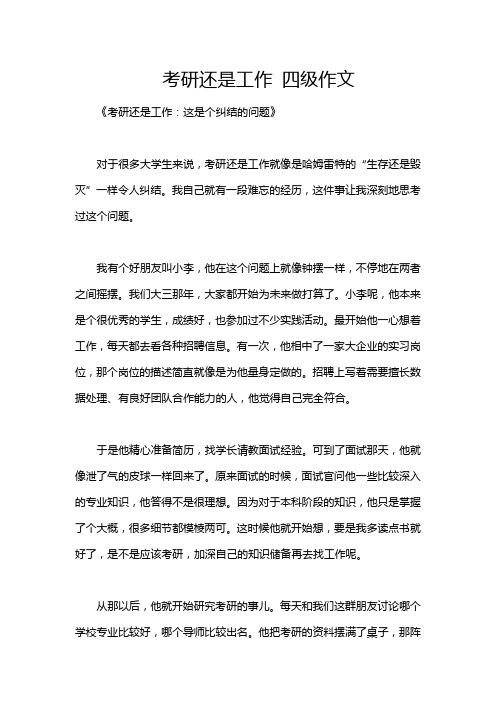
考研还是工作四级作文《考研还是工作:这是个纠结的问题》对于很多大学生来说,考研还是工作就像是哈姆雷特的“生存还是毁灭”一样令人纠结。
我自己就有一段难忘的经历,这件事让我深刻地思考过这个问题。
我有个好朋友叫小李,他在这个问题上就像钟摆一样,不停地在两者之间摇摆。
我们大三那年,大家都开始为未来做打算了。
小李呢,他本来是个很优秀的学生,成绩好,也参加过不少实践活动。
最开始他一心想着工作,每天都去看各种招聘信息。
有一次,他相中了一家大企业的实习岗位,那个岗位的描述简直就像是为他量身定做的。
招聘上写着需要擅长数据处理、有良好团队合作能力的人,他觉得自己完全符合。
于是他精心准备简历,找学长请教面试经验。
可到了面试那天,他就像泄了气的皮球一样回来了。
原来面试的时候,面试官问他一些比较深入的专业知识,他答得不是很理想。
因为对于本科阶段的知识,他只是掌握了个大概,很多细节都模棱两可。
这时候他就开始想,要是我多读点书就好了,是不是应该考研,加深自己的知识储备再去找工作呢。
从那以后,他就开始研究考研的事儿。
每天和我们这群朋友讨论哪个学校专业比较好,哪个导师比较出名。
他把考研的资料摆满了桌子,那阵仗就好像他已经是个考研大军中的绝对勇士了。
但过了一段时间,又出现了新的状况。
他看到身边那些去工作的同学,有一些已经可以自己赚钱,过上了相对自由的生活。
他开始羡慕了,再看看自己还得天天坐在自习室里啃那些书本,又觉得考研太苦了,他又有些动摇。
这时候我就在想,考研有考研的好处。
就像盖房子,考研就是给你的知识房子再添几块砖,让它更结实。
有了更高的学历,你在就业市场上有时候就像是拿着一张高级通行证一样。
但是工作呢,也有它的吸引力。
早早进入社会,能更快地适应社会规则,积攒人脉,还可以马上赚钱享受生活。
如果选择考研,那你要做好吃苦的准备。
像小李那样,要面临巨大的学习压力,每天和那些复杂的书本知识死磕。
而且,你还得有很强大的心理承受能力,要是考不上,就感觉像是在这场关于未来的战局里输了一盘很大的棋。
工作还是考研英语作文
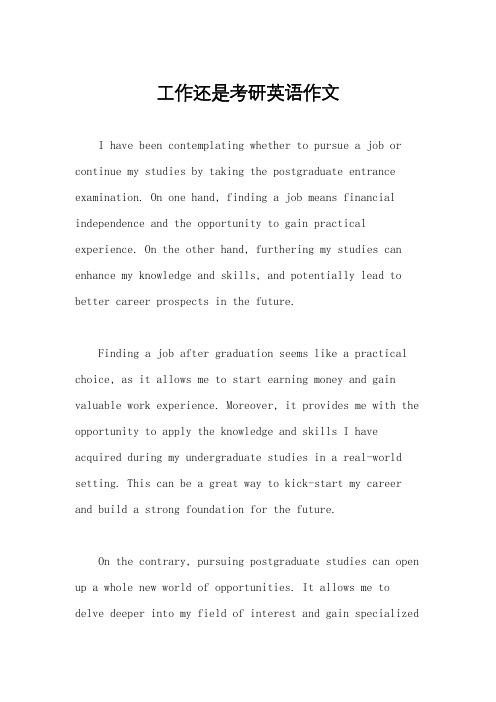
工作还是考研英语作文I have been contemplating whether to pursue a job or continue my studies by taking the postgraduate entrance examination. On one hand, finding a job means financial independence and the opportunity to gain practical experience. On the other hand, furthering my studies can enhance my knowledge and skills, and potentially lead to better career prospects in the future.Finding a job after graduation seems like a practical choice, as it allows me to start earning money and gain valuable work experience. Moreover, it provides me with the opportunity to apply the knowledge and skills I have acquired during my undergraduate studies in a real-world setting. This can be a great way to kick-start my career and build a strong foundation for the future.On the contrary, pursuing postgraduate studies can open up a whole new world of opportunities. It allows me to delve deeper into my field of interest and gain specializedknowledge. Additionally, having a postgraduate degree can give me a competitive edge in the job market andpotentially lead to higher earning potential in the long run.However, finding a job right after graduation may also come with its own set of challenges. The job market is competitive, and it may take time to land a job that aligns with my career goals and offers a decent salary. On the other hand, postgraduate studies require a significant investment of time and money, and there is no guarantee of immediate returns in terms of career advancement.In conclusion, both finding a job and pursuing postgraduate studies have their own merits and drawbacks. Ultimately, the decision boils down to my personal career goals, financial situation, and long-term aspirations. Itis important to weigh the pros and cons of each option carefully before making a well-informed decision.。
工作还是考研 英文范文
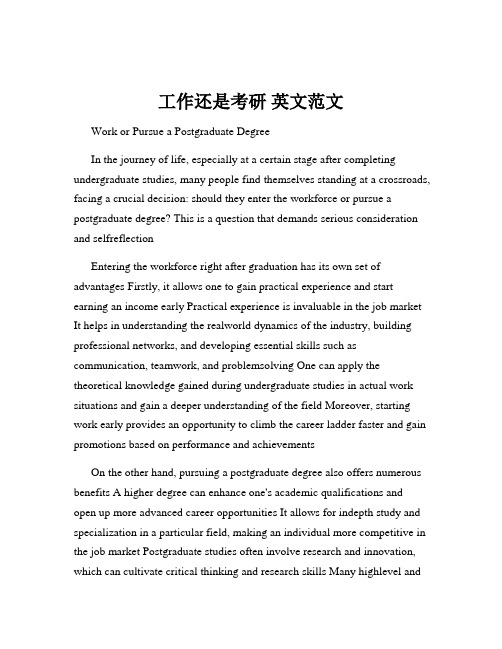
工作还是考研英文范文Work or Pursue a Postgraduate DegreeIn the journey of life, especially at a certain stage after completing undergraduate studies, many people find themselves standing at a crossroads, facing a crucial decision: should they enter the workforce or pursue a postgraduate degree? This is a question that demands serious consideration and selfreflectionEntering the workforce right after graduation has its own set of advantages Firstly, it allows one to gain practical experience and start earning an income early Practical experience is invaluable in the job market It helps in understanding the realworld dynamics of the industry, building professional networks, and developing essential skills such as communication, teamwork, and problemsolving One can apply the theoretical knowledge gained during undergraduate studies in actual work situations and gain a deeper understanding of the field Moreover, starting work early provides an opportunity to climb the career ladder faster and gain promotions based on performance and achievementsOn the other hand, pursuing a postgraduate degree also offers numerous benefits A higher degree can enhance one's academic qualifications and open up more advanced career opportunities It allows for indepth study and specialization in a particular field, making an individual more competitive in the job market Postgraduate studies often involve research and innovation, which can cultivate critical thinking and research skills Many highlevel andspecialized positions, especially in academia, research institutions, and certain industries, prefer or require candidates with postgraduate degreesThe decision between work and postgraduate studies also depends on one's career goals If the desired career path has clear educational requirements or if one aspires to reach the top positions in a specific field, a postgraduate degree might be necessary For example, in fields like medicine, law, and academia, advanced degrees are often a prerequisite for significant career advancement However, for some industries where practical experience and skills are more valued, such as marketing, sales, and certain areas of business, starting work immediately after graduation might be a better choiceFinancial considerations also play a role in this decision Pursuing a postgraduate degree often incurs additional costs, including tuition fees and living expenses One needs to assess whether the potential increase in future earnings after obtaining the degree outweighs the current financial investment If financial stability is a concern, entering the workforce and saving money first might be a more practical optionPersonal interests and passion should not be overlooked If someone has a strong passion for academic research and a thirst for knowledge, they might find more fulfillment in pursuing a postgraduate degree On the contrary, if an individual is eager to start applying their skills in a practical setting and is less interested in academic studies, entering the workforce might be the right pathFurthermore, the job market situation also influences this decision In a highly competitive job market, having a postgraduate degree might give anedge However, if there is a high demand for workers in a particular field and undergraduate qualifications are sufficient to secure good job opportunities, starting work early could be beneficialAnother factor to consider is the individual's learning style and ability to cope with academic pressure Postgraduate studies are more demanding and require a high level of selfdiscipline and commitment One needs to evaluate if they are ready for the challenges and rigors of advanced academic pursuitsIn conclusion, the decision between work and pursuing a postgraduate degree is highly individual and depends on a combination of factors such as career goals, financial situation, personal interests, the job market, and learning capabilities It is not a onesizefitsall choice and requires careful selfassessment and research Whichever path is chosen, it should align with one's longterm aspirations and be pursued with dedication and determination。
有关考研好还是工作好的英语作文
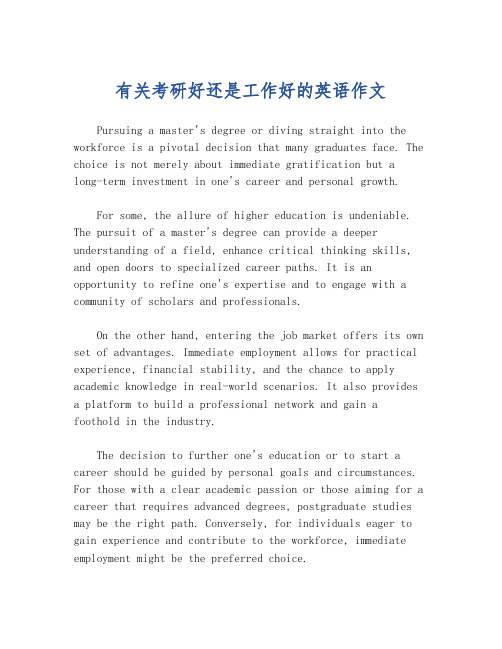
有关考研好还是工作好的英语作文Pursuing a master's degree or diving straight into the workforce is a pivotal decision that many graduates face. The choice is not merely about immediate gratification but along-term investment in one's career and personal growth.For some, the allure of higher education is undeniable. The pursuit of a master's degree can provide a deeper understanding of a field, enhance critical thinking skills, and open doors to specialized career paths. It is an opportunity to refine one's expertise and to engage with a community of scholars and professionals.On the other hand, entering the job market offers its own set of advantages. Immediate employment allows for practical experience, financial stability, and the chance to apply academic knowledge in real-world scenarios. It also provides a platform to build a professional network and gain a foothold in the industry.The decision to further one's education or to start a career should be guided by personal goals and circumstances. For those with a clear academic passion or those aiming for a career that requires advanced degrees, postgraduate studies may be the right path. Conversely, for individuals eager to gain experience and contribute to the workforce, immediate employment might be the preferred choice.Another factor to consider is the financial aspect. The cost of graduate education can be substantial, and the return on investment must be weighed against the potential earnings and career advancement opportunities that come with work experience.Ultimately, the choice between graduate school and the workplace is deeply personal and should align with one's career aspirations, financial situation, and life goals. It is essential to conduct thorough research, seek advice from mentors, and reflect on what will provide the most fulfilling and successful future.In conclusion, there is no one-size-fits-all answer to whether pursuing a master's degree or starting a career is better. It is a decision that requires careful consideration of individual priorities, ambitions, and the current job market. Whether one chooses to further their education or to embark on a professional journey, the key is to remain adaptable and open to the opportunities that lie ahead.。
毕业后工作还是研究生 英语作文
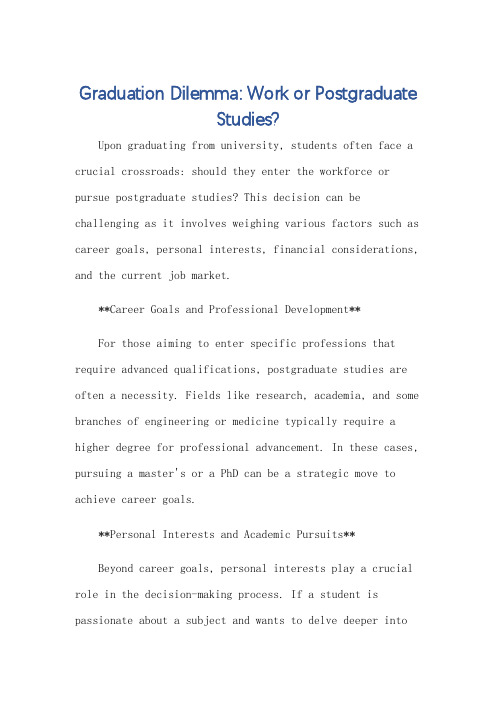
Graduation Dilemma: Work or PostgraduateStudies?Upon graduating from university, students often face a crucial crossroads: should they enter the workforce or pursue postgraduate studies? This decision can be challenging as it involves weighing various factors such as career goals, personal interests, financial considerations, and the current job market.**Career Goals and Professional Development**For those aiming to enter specific professions that require advanced qualifications, postgraduate studies are often a necessity. Fields like research, academia, and some branches of engineering or medicine typically require a higher degree for professional advancement. In these cases, pursuing a master's or a PhD can be a strategic move to achieve career goals.**Personal Interests and Academic Pursuits**Beyond career goals, personal interests play a crucial role in the decision-making process. If a student is passionate about a subject and wants to delve deeper intoit, pursuing postgraduate studies can be a rewarding experience. It offers an opportunity to engage with experts in the field, conduct research, and expand knowledge in a specific area.**Financial Considerations**Financial factors also play a significant role in choosing between work and postgraduate studies. Postgraduate programs can be costly, and students may need to consider the financial implications of such a decision. On the other hand, entering the workforce immediately can provide a stable income and help students gain financial independence.**Job Market and Employment Prospects**The job market and employment prospects are also essential considerations. In some industries, job opportunities may be more plentiful for those with postgraduate qualifications. However, in other sectors, a master's degree may not necessarily provide a significant advantage over those with undergraduate qualifications. Therefore, it's crucial to research the job market and understand the employment prospects in one's desired field.**Balancing the Pros and Cons**Balancing the pros and cons of each option is essential. Working immediately can provide practical experience and financial stability, while postgraduate studies can offer advanced qualifications and deeper academic engagement. Consideration of long-term career goals, personal interests, financial situation, and job market trends can help individuals make an informed decision.**The Bottom Line**Ultimately, the decision to work or pursue postgraduate studies should be based on an individual's unique circumstances and goals. It's important to carefully consider all factors, conduct thorough research, and make a decision that aligns with one's career aspirations and personal values.**毕业后的抉择:工作还是研究生?**大学生毕业后,常常面临一个关键的抉择:是进入职场还是继续攻读研究生?这个决定充满挑战,因为它涉及权衡各种因素,如职业目标、个人兴趣、经济状况以及当前的就业市场。
英语作文工作或者考研
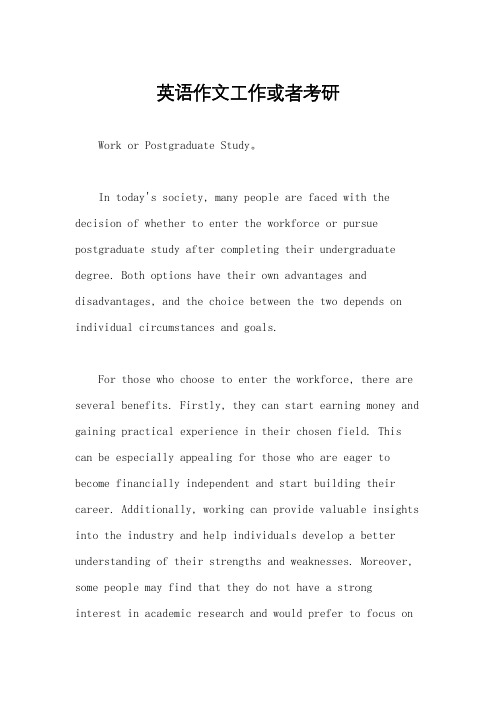
英语作文工作或者考研Work or Postgraduate Study。
In today's society, many people are faced with the decision of whether to enter the workforce or pursue postgraduate study after completing their undergraduate degree. Both options have their own advantages and disadvantages, and the choice between the two depends on individual circumstances and goals.For those who choose to enter the workforce, there are several benefits. Firstly, they can start earning money and gaining practical experience in their chosen field. This can be especially appealing for those who are eager to become financially independent and start building their career. Additionally, working can provide valuable insights into the industry and help individuals develop a better understanding of their strengths and weaknesses. Moreover, some people may find that they do not have a stronginterest in academic research and would prefer to focus onpractical applications of their knowledge.On the other hand, pursuing postgraduate study also has its own advantages. Firstly, it provides an opportunity for individuals to deepen their knowledge and expertise in a specific area. This can be particularly beneficial for those who are interested in pursuing a career in academia or research. Additionally, postgraduate study can open up new opportunities for networking and collaboration with experts in the field. Furthermore, obtaining a higher degree can lead to better job prospects and higher earning potential in the long run.However, there are also challenges associated with both options. For those who choose to enter the workforce, they may face difficulties in finding a job that matches their qualifications and interests. Additionally, they may encounter challenges in balancing work and personal life, as well as adapting to the demands of a professional environment. On the other hand, pursuing postgraduate study can be financially burdensome and time-consuming. It requires a significant investment of time and resources,and there is no guarantee of immediate returns in terms of career advancement.Ultimately, the decision to work or pursue postgraduate study depends on individual goals, interests, and circumstances. Some people may find that they are more suited for the practical challenges of the workforce, while others may be more inclined towards the academic pursuits of postgraduate study. It is important for individuals to carefully consider their options and weigh the pros and cons before making a decision. Regardless of the choice, both options can lead to fulfilling and successful careers, as long as individuals are committed to their goals and willing to put in the effort.。
就业与考研的英语作文

就业与考研的英语作文Finding a job after graduation is a common concern for many students. Some choose to enter the workforce directly, while others prefer to pursue further education by taking the postgraduate entrance examination.Job hunting can be a daunting task, as the competition is fierce and the job market is constantly changing. It requires patience, perseverance, and a proactive attitude to secure a satisfying position. On the other hand, preparing for the postgraduate entrance examination demands a great deal of effort and dedication. It involves studying intensively and mastering the knowledge and skills required for the specific field of study.For those who are eager to start their careers, finding a job right after graduation can provide valuable work experience and financial independence. It allows them to apply the knowledge and skills they have acquired in a practical setting and gain a better understanding of theirchosen profession. On the contrary, pursuing postgraduate studies can open up more opportunities for academic and professional development. It provides a chance to delve deeper into a specific area of interest and gain specialized knowledge and expertise.While some may argue that having work experience is more important than obtaining a higher degree, others believe that further education can lead to better career prospects and higher earning potential. Both options have their own merits and drawbacks, and the decision ultimately depends on individual goals, interests, and circumstances.In conclusion, whether to enter the workforce or pursue postgraduate studies is a personal choice that requires careful consideration. Both paths have their own challenges and rewards, and it is important to weigh the pros and cons before making a decision. Ultimately, the key is to choose the path that aligns with one's aspirations and long-term career goals.。
考研或工作的英语作文

考研或工作的英语作文As the curtain falls on the undergraduate chapter of our academic journey, many of us are faced with a pivotal decision: to continue our education by pursuing a graduate degree or to step into the professional world and start our careers. This decision is not one to be taken lightly, as it can significantly shape our future trajectories. In this essay, we will explore the merits and challenges of both paths, offering insights to help navigate this crucial crossroads.On the one hand, graduate studies offer a deeper diveinto a particular field of study. They provide an opportunity to specialize and gain expertise that can be invaluable in certain industries. A master's or doctoral degree can open doors to positions that are otherwise unattainable for those with only a bachelor's degree. Furthermore, the research and critical thinking skills honed during graduate studies can be a lifelong asset, fostering a mindset that is analytical, innovative, and adaptable.However, the pursuit of higher education is not without its challenges. The financial burden of tuition fees and the opportunity cost of the time spent in school can be substantial. Additionally, the job market can be competitive, and there is no guarantee that an advanced degree will necessarily translate into a higher-paying job or a more satisfying career.Conversely, entering the workforce immediately after graduation can provide practical experience and financial independence. The real-world application of knowledge gained during undergraduate studies can lead to rapid professional growth and the development of a professional network. Moreover, the work experience itself can be a form of education, teaching valuable lessons about teamwork, leadership, and time management that may not be covered in a classroom setting.Yet, the decision to work right away also comes with its own set of considerations. The initial lack of experience can lead to lower starting salaries and potentially less desirable job positions. Additionally, the fast-paced nature of the professional world can be demanding and may leavelittle time for further education or personal development.In conclusion, the choice between pursuing graduate studies or entering the workforce is a deeply personal one that depends on individual goals, financial situations, and career aspirations. It is essential to weigh the long-term benefits against the short-term sacrifices and to consider the potential impact on one's overall career satisfaction and personal fulfillment. Ultimately, there is no one-size-fits-all answer, and the right choice will vary from person to person.。
- 1、下载文档前请自行甄别文档内容的完整性,平台不提供额外的编辑、内容补充、找答案等附加服务。
- 2、"仅部分预览"的文档,不可在线预览部分如存在完整性等问题,可反馈申请退款(可完整预览的文档不适用该条件!)。
- 3、如文档侵犯您的权益,请联系客服反馈,我们会尽快为您处理(人工客服工作时间:9:00-18:30)。
英语四级作文真题:工作or考研
作文题目: For this part, you are allowed 30 minutes to write
an essay. Suppose you have two options upon graduation:one is to take a job in a company and the other to go to a
graduate school. You are to make a choice between the two.
Write an essay to explain the reasons for your choice. You
should write at least 120 words but no more than 180 words.
参考范文: Upon graduation, virtually all college
students will confront the problem of the career choice
,which is truly a tough choice. Students' opinions differ
greatly on this issue. Some hold that priority should be
given to take a job, but others take the attitude that going
to a graduate school is the most critical factor influencing
their future career choices.
As to myself, I prefer the latter view. A higher
educational background exerts a tremendous fascination on a
great number of people, with no exception to me. This
phenomenon that the graduates have difficulties in finding
job after their graduation can easily be found anywhere in
our daily life, especially on campus. On the one hand, with
the improved high education of Chinese college students which
directly brought the result that there are more and more
graduates every year. On the contrary, job vacancies don
’t increase that fast. More people, less food, which is the
exact description of the hard condition. On the other hand,
more and more people go on to pursue their master and doctor degree; more and more Chinese oversea students come back to China to hunt better working chances. It is sure that the
competition is more and more fierce.
Therefore, it is high time that we took effective measures to improve our own competitiveness. That is the secret of success in the future employment market after our graduation.。
